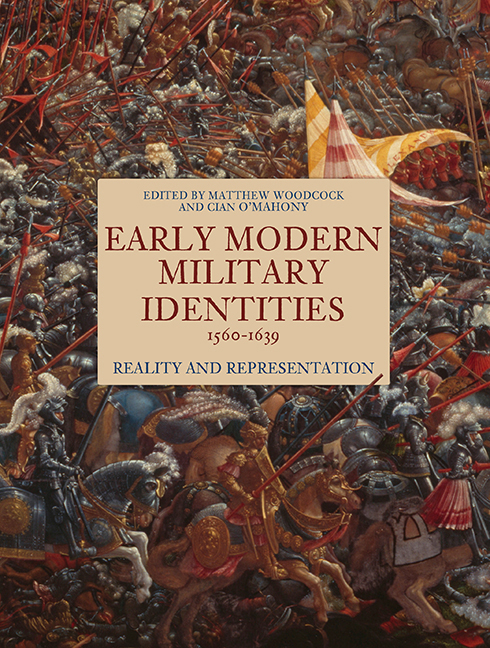Book contents
- Frontmatter
- Contents
- List of Illustrations
- List of Contributors
- Acknowledgments
- List of Abbreviations
- Introduction
- Part I Models of Military Identity
- 1 ‘Warlike prowesse and manly courage’: Martial Conduct and Masculine Identity in Late Tudor and Early Stuart England
- 2 ‘The Breviarie of Soldiers’: Julius Caesar's Commentaries and the Fashioning of Early Modern Military Identity
- 3 ‘Souldiers, or Clarkes, or both’: Ralph Knevet and the Fashioning of Military Identity through Print and Performance in Caroline Norwich
- 4 Thomas, First Lord Fairfax and ‘The Highway to Heidelberg’
- Part II Military Identities in Early odern Ireland
- Part III Staging Military Identities
- Afterword: The Way Ahead
- Bibliography
- Index
1 - ‘Warlike prowesse and manly courage’: Martial Conduct and Masculine Identity in Late Tudor and Early Stuart England
from Part I - Models of Military Identity
Published online by Cambridge University Press: 14 September 2019
- Frontmatter
- Contents
- List of Illustrations
- List of Contributors
- Acknowledgments
- List of Abbreviations
- Introduction
- Part I Models of Military Identity
- 1 ‘Warlike prowesse and manly courage’: Martial Conduct and Masculine Identity in Late Tudor and Early Stuart England
- 2 ‘The Breviarie of Soldiers’: Julius Caesar's Commentaries and the Fashioning of Early Modern Military Identity
- 3 ‘Souldiers, or Clarkes, or both’: Ralph Knevet and the Fashioning of Military Identity through Print and Performance in Caroline Norwich
- 4 Thomas, First Lord Fairfax and ‘The Highway to Heidelberg’
- Part II Military Identities in Early odern Ireland
- Part III Staging Military Identities
- Afterword: The Way Ahead
- Bibliography
- Index
Summary
Manhood and masculinity once barely registered on the horizon of historians of early modern England. History was tacitly understood as being, on the whole, the record of actions by men; thus, while (male) historians grudgingly conceded that women's history might be justified, there was, to judge by their lack of interest, no need for men's history or for consideration of gender roles. This was true even when dealing with the history of war and soldiering, an area of life that was distinctly gendered (in theory and largely, though not entirely, in practice). In the historiography of early modern England up to the early 1980s, explicit treatment of gender roles was uncommon and cursory, even in cultural histories, while the concept of a whole separate history of masculinity seems never to have crossed the minds even of historiographical giants. As late as 1992, Sir Geoffrey Elton – himself a Second World War veteran, and thus well aware of the masculine nature of armies – published an essay on war and the English people that ignores the female half of the population entirely and says nothing about gender roles or masculinity, despite passages that seem to cry out for critical reflection on how manhood was defined in early modern England. Nor was this untypical of Elton's oeuvre.
By the early 1990s there was wider historiographical interest in the roles of men and women, yet the sub-disciplines of gender history and men's history were still developing. They arose out of women's history and women's studies, especially from a growing awareness that treating women ‘in isolation from men’ was a limitation, and that omitting the comparative perspective of men's history ‘wrenched [women's history] from its historical context’. Consequently, pioneers of women's history began to encourage gender history, on the grounds ‘that we should be interested in the history of both women and men’, since ‘concentrating on women’ begged serious questions about the relative position of the sexes. Interest in early modern masculinity and manhood was initially rather more typical of scholars of literary and cultural studies than historians, as Elton's example suggests.
- Type
- Chapter
- Information
- Early Modern Military Identities, 1560–1639Reality and Representation, pp. 25 - 55Publisher: Boydell & BrewerPrint publication year: 2019



